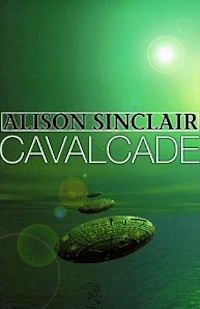Alison Sinclair says that Cavalcade (1998) was the result of thinking about alien abductions and wondering what would happen if the aliens asked for volunteers. An alien spaceship comes into the solar system. It doesn’t respond to attempts to contact it except for broadcasting a message that it’s going on a one way trip and anyone who wants to join it should be within ten metres of a body of water on a specific date. The book begins with everyone who showed up finding themselves on the ship, with their electronics dead but everything else they brought with them working. They are a strange mixture of people, and they are confronted with the mystery of an alien ship with no aliens and no explanations.
It’s harder to imagine deciding not to go, and I’d be very interested in the story of how Earth’s history went forward from then on, knowing there were aliens and there had been one alien visit and that was probably it.
The story we have is the story of the people who went, from a whole set of points of view—the NASA scientist, the medical researcher, the pregnant teenager, the psychopath on the run. Through them we meet all kinds of other people—the women who had read Tiptree and taken it very seriously, the army group, the disaster relief organizer, the octogenarian WWII resistance fighter. There are lots of great female characters here, especially Hathaway the pregnant teenager, whose sections really glow. We’re told there are people from all over the planet but they have been put together by language, and those we follow are all Americans. Two of our point of view characters are mixed race. All of them have secrets.
Sinclair gives us these people, establishes them, and gives them and us a mystery, the ship, how it works, where it’s going, why, what’s going on, the absentee aliens, communication. Communication is the theme of the novel, communication with the ship, with the aliens, and between people. There’s a plague, a war, love, death, lots of events, but the hope of resolution of the mysteries is what keeps you reading, and the resolutions are well done—I am always disappointed with books where there’s a great set up and the revelation leaves you thinking “Is that all?” This isn’t the case here.
I always consider my first re-read of a book the completion of my reading process. The first time through Cavalcade I was so wrapped up in wanting to know what happened that I found myself reading faster and faster. This time I had time to linger and enjoy the characters and the way in which they worked things out—and how very differently they do it, with logic versus intuition. It’s thought provoking in a lot of ways—not just whether we’d go when we don’t know where or why, but the ethics of how people act to each other and the fundamental question of what justice is in complex situations. It’s a terrific book and a pleasure to read.
Cavalcade reminds me a little of Butler’s Xenogenesis (Lilith’s Brood) books, and a little of Farmer’s Riverworld books. It’s quite different from either, but it falls into the same conceptual space. It was nominated for the Clarke Award but it never had a U.S. edition and it’s difficult to find. I’m surprised nobody picked this up because it’s the kind of intelligent interesting SF we want to be reading and thinking about.
Jo Walton is a science fiction and fantasy writer. She’s published two poetry collections and nine novels, most recently the Nebula winning Among Others. She reads a lot, and blogs about it here regularly. She comes from Wales but lives in Montreal where the food and books are more varied.










